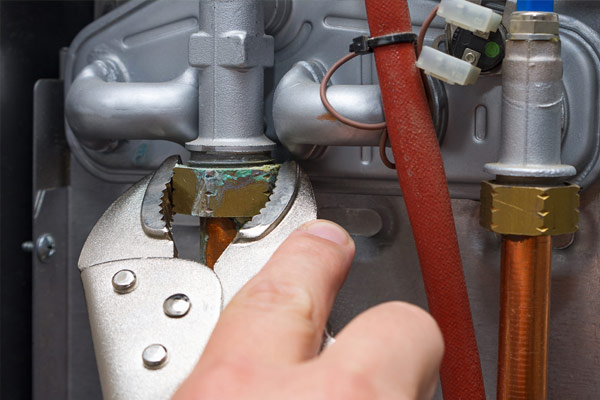
Do This if Your Furnace is Leaking Water
Furnace leaks can be destructive if left untreated. A furnace repair specialist will diagnose the source of the problem and offer a lasting solution. But before an emergency furnace repair professional comes, here are some troubleshooting steps to take.
Water damage is a common household problem many homeowners face. A water leak can be a significant issue and even lead to the growth of mold. This can interfere with indoor air quality and eventually cause sicknesses. Furnace leaking water is a headache many homeowners dread. However, no need for panicking as the cause of the leak could be something small and easy to fix. Troubleshooting can help fix minor issues, but contact an HVAC professional for necessary furnace repairs if the problem is serious.
It’s better to address the problem before it causes serious damage that will lead to costly repairs down the road. This post provides information on what can be done in case of furnace leak, but first, it will help to know why furnaces leak water and the dangers associated.
Common Issues that Cause Furnace to Leak Water
To help narrow down the cause of the leak, identify the furnace type. It is pretty easy to identify the type of furnace by looking at the exhaust pipe. A high-efficiency condensing furnace has a white plastic PVC vent pipe, while a standard-efficient furnace has a metal furnace and does not produce condensation.
So, what causes a high-efficiency furnace to leak water?
High-efficiency furnaces create condensation during their regular operation, so the water leakage will most likely need minor furnace repair. The most common causes include:
Blocked Condensate Drain Hose
A high-efficiency furnace naturally produces condensation that is drained away by a condensate line or drain hose. Sometimes the drain hose gets clogged, resulting in leaking around the furnace base. Once the water pools up, it can cause water damage.
Condensate Pump Leaking
The condensate pump is another component that clogs, resulting in leaking. The condensate drains into the condensate pump, and a blocked drain can cause a furnace to leak water. If you notice water on the floor around the furnace unit, or rust stains within the cabinet, the condensate is not draining appropriately. Also, a malfunctioned pump can cause water to go back and cause a leak.
Inducer Assembly Problems
The condensate runs down the exhaust into the inducer assembly through the condensate drain hose. If the inducer assembly has a crack, water will start leaking out of the furnace.
What if it’s a conventional or a non-efficiency furnace? What could be the cause of the water leak? Here are some areas to look out for:
Water Leaking from the Humidifier
If the furnace has a built-in humidifier and has a leak, it could be the reason there is a pool of water around the furnace. Typically, humidifiers require water to create humidity, so water flows and drains out of the humidifier. If water lines break, crack, or get clogged, it can cause water to leak from the humidifier.
Damaged Drain Pain
AC units have a drain pan located under the evaporator coil. Some have another drain pan beneath the unit. The purpose of the drain pan is to catch condensate, and if there is a crack, the excess water will leak out. When the furnace leaks water when the AC is on, the problem may not be the furnace but the AC unit.
Poorly Designed Vent Pipe
The flue pipe in the conventional furnace carries away gases produced during the combustion process out of the home. If the exhaust pipe has no slope or is too big, it allows too much air to circulate, which causes gases to get trapped in the flue. When these gases stay in the flue for long, they cool and form condensation, leaking out of the furnace to the surrounding areas.
How Dangerous is a Furnace Leaking Water
Though a leaking furnace may not pose an immediate risk to homeowners’ safety, it can compromise their comfort. If the leaking problem is not treated, it can become costly to repair.
A leaking furnace can cause rust to develop, which destroys the working areas of the furnace. Eventually, it will increase inefficiency and lead to breakdowns and costly repairs. Worse still is when rust develops a crack or a hole on the heat exchanger, causing exposure to harmful gases. Inhaling toxic gases can have severe repercussions on homeowners’ overall health.
Apart from damaging the heat exchange, water leaking from the furnace can damage electrical components. This can damage the furnace, causing it to stop working at all. For instance, a circuit board transmits signals needed for the furnace to start heating. If water leaks to the circuit board, you will end up replacing it as soon as possible. Call a qualified HVAC service professional for emergency furnace repair before things get worse.
Steps to Take if a Furnace is Leaking water
Leaks can be destructive, and if left untreated, they can damage floors, furnace parts, and walls, leading to mold growth. A furnace repair specialist will diagnose the source of the problem and offer a lasting solution. But before an emergency furnace repair professional comes, here are some troubleshooting steps to take:
1. Turn off the furnace
Turning off the furnace will stop more water from leaking. Either turn the furnace switch off or turn it off from the thermostat. Another option is turning the unit off at the breaker if it gets hard to locate the furnace switch.
2. Clean up the water
After turning off the furnace, clean up all the water pooled up around the base as much as possible. Use napkins or towels to clean, but consider using a wet-dry vacuum if the water is too much.
3. Clean up the water inside the furnace
Don’t panic. Cleaning up the water inside the furnace isn’t complicated or dangerous. Just unscrew the front panel of the furnace and wipe the water inside. However, if it feels uncomfortable, call for emergency furnace repair services.
4. Check the air filter
Check if the air filter is clogged or dirty. It is a possible cause of the leak, and buying and installing a new one can probably solve it. If unsure of how to do it, call for professional furnace repair services.
5. Call an HVAC technician
Don’t wait for the problem to get worse. Always call a furnace repair technician for emergency furnace repair services.
How to Prevent Furnace Issues in the Future
A leaking furnace can be expensive to repair. The cost of the repair can be more than $300, depending on the type of furnace. Luckily, there is what to do to prevent leaks from happening in the first place. Scheduling routine maintenance is one of the proactive steps to take. It is a good idea to hire qualified technicians for inspection and tuning-up services each year. HVAC experts from a reputable company can identify signs of an impending problem and prevent it from happening — like clogs or leaks that could be costly to repair later on.
In addition, routine HVAC maintenance will increase the unit’s longevity and help keep the utility bills under control. HVAC professionals will also be able to diagnose the cause of the leak and know how to fix it to prevent the problem from reoccurring.
The longer the heating unit leaks water and loses energy efficiency, the more likely it will cause other problems like property damage. When it’s time for furnace repair, every minute wasted worsens the situation. Contact Patriot Air Comfort Systems today and resolve the furnace leaking water problem.
